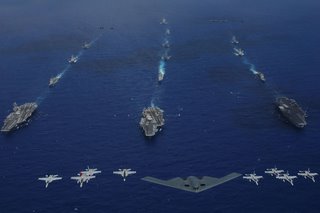Cold War 2006

Cold War Not Over
by Claude Salhani
UPI International EditorWashington (UPI) May 24, 2006
The Cold War is over. The Soviet empire has collapsed. The West has won. The countries of the former Eastern Bloc have nearly all turned to democracy and many have even joined NATO and the European Union. Nuclear weapons (at least some of them) have been dismantled. The world is a far safer place now. Or is it?
True, the demise of the Soviet Union and the destruction of hundreds of nuclear weapons, those left behind in the former Soviet republics, such as Kazakhstan, Uzbekistan, Turkmenistan and others, have made the world much safer than it had been since the end of World War II.
But that was before Sept. 11, 2001, before Iran's desires to join the nuclear club became public knowledge, and before the United States began thinking of positioning missile batteries in former European Soviet satellite states, and in Britain.
According to London's The Independent on Sunday newspaper, the United States is investigating the possibilities of setting up interceptor missile sites in Poland, the Czech Republic and in Great Britain. The report claims both former communist countries are keen to host the new missiles. But a senior Polish diplomat in Washington told United Press International he was not aware of any such deals.
And in the United Kingdom, still according to The Independent on Sunday, British Prime Minister Tony Blair has agreed, in secret, to allow the Bush administration to site U.S. missiles on British soil. The newspaper refers to the deal as "part of the new 'son of Star Wars' program."
The paper reports that No.10 Downing Street "has given an agreement in principle to the Pentagon to station interceptor missiles at RAF Fylingdales, North Yorkshire." The newspaper called the basing of interceptor missiles on British soil "the most significant new military U.S. presence in this country since the withdrawal of cruise missiles 13 years ago."
But Prime Minister Blair and his Secretary of Defense Geoff Hoon refuse to discuss the matter in any detail.
The main preoccupation of the Bush administration in having a missile defense system in central Europe is primarily aimed to deter eventual hostile missiles from Iran. The Islamic republic's Shahab-4 ballistic missile -- meaning meteor, or shooting star in Farsi, is derived from the North Korean No-dong-2 missile. It has a range of 1,367-1,799 miles and can carry a 2,200-pound warhead. Iran has long denied building a Shahab-4.
This, in effect, would place the Baltic states, Poland, parts of Germany and Italy, as well as all of Israel, within reach of Iran's missile system.
"If the Americans attack Iran, the world will change... They will not dare to make such a mistake," former Iranian President Ali Akbar Haschemi Rafsanjani, once said.
"We view Iran's efforts to further develop its missile capabilities as a threat to the region and to the United States' interests, and all the more so in light of its ongoing nuclear program," said Adam Ereli, a U.S. State Department spokesman.
Regardless of the reasons pushing the United States to deploy interceptors in former Soviet satellite states, the fact is that it will not be well received in Moscow. Russian President Vladimir Putin, already not best pleased with what he regards as the West's (read the United States and the EU) infringement on his domain, will not likely be overjoyed. So what can he do? How can he fight back?
Putin can get back at the Western alliance by doing exactly what the Soviet Union used to do; support the enemies of the West. In this case, support Iran. Now far more Machiavellian that jut supporting Iran would be to try and build a new alliance based on Iranian influence, but this time retracing the footsteps of Genghis Khan but in the reverse sense, going eastward from Iran to unite the former "Stans," under the influence of Islam.
Putin hopes he can copy the Reagan administration that supported the mujahideen, and the Israelis who created Hamas. Putin thinks he can use the Islamist card in his favor. But more likely than not, just as it backfired for the Americans, and just like it backfired for the Israelis, hence, so too, will it not work for Putin and it will more likely than not come back to haunt him.
Has the Soviet empire collapsed? Certainly. Has the West won? Undoubtedly. Have most countries of the former Eastern Bloc turned to democracy? Unquestionably. Are there fewer nuclear weapons in the world? Not for long.
Once Iran officially acquires nukes, well, it won't be long before Egypt, Saudi Arabia and maybe even Qatar start their own nuclear programs while rogue states, or yet more frightening, rogue individuals, will be looking to purchase WMD on the black bazaar. Is the world a far safer place today? Hardly. Is the Cold War over? Yes, but a tepid one is about to start.


<< Home